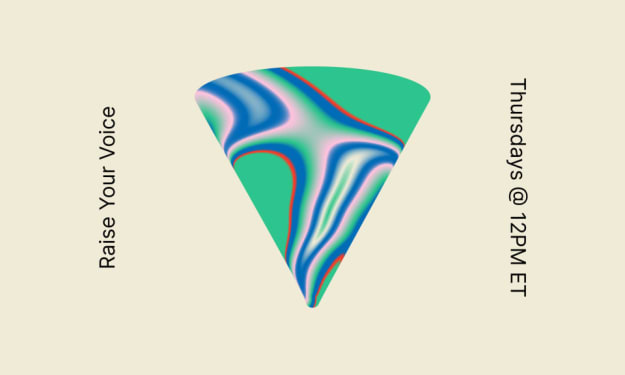Panic Attacks - How To Help Yourself or a Loved One
Understanding panic/anxiety attacks can help you comfort a family member, close friend, or partner.

Panic attacks suck. They can be debilitating. At times, they are brought on by built up stress-worries about getting the perfect score on an exam, or a recurring family conflict, like arguments about insufficient household funds. Sometimes they can be caused by a very sudden stressor, like a car accident. Then there are those unlucky lot who are ambushed by panic attacks out of the blue, for no reason at all. Random occurrences of panic attacks are especially common with people who have experienced some type of trauma in their life. Now, that doesn't mean that you can't have a panic attack if you haven't experienced a trauma. In fact, most people will experience at least one attack in their lifetime. Though it is far more common in people with anxiety disorders.
Having a sudden panic attack can be scary, for both you and a loved one. Depending on the severity, the symptoms can be paralyzing.
What a Panic Attack Feels Like
If your loved one suffers from frequent panic attacks, understanding what it's like may help you to better comfort them. So, I'll walk you through one of my attacks, and the common symptoms that accompany it. Keep in mind, everyone is different in the ways they experience panic.
I start feeling anxious. Often for no reason. I search my brain for possibilities. Perhaps I've forgotten something important, or maybe it's the cup of coffee I had this morning that's making my heart race. I grow increasingly uncomfortable. Within seconds I want to shake myself out of my skin. Waves of nausea run through me one after the other, the blood drains from my face and runs cold. By this time I know for certain. I'm about to have another panic attack.
My knees turn to jelly, I break out into a cold sweat, and I get this overwhelming feeling that I'm about to faint. My hands get clammy, and my chest starts to tighten. It's overwhelming. All of these components come together to form a truly dreadful feeling.
Then, I breathe. Rattling gasps in and out. Quick mouthfuls of air enter my lungs only to be ripped out and replaced by another. I can't quite catch my breath. Im hit with horrible dizzy spells. My head spins. My hands start to shake, and my entire body follows suit. I can feel myself teetering on the edge of here and not. I try my best to control my breathing, because I know if I don't I'll faint, wake, and then start the cycle over again. Heavy breathing, and then blackness.
When the attack peaks, I am unable to move, speak, or breathe. I am suffocating on a continuous feeling of panic and dread. The worst part of it only lasts a few minutes, though an entire attack could last anywhere from 15 minutes to an hour. When the attack finally starts to subside, I am left exhausted, drained of all energy and emotion.
When the Attack Hits
If you experience frequent attacks, and you find yourself on the verge of another one, NEVER isolate yourself. Hiding away to avoid embarrassment is not wise. I say this because I had a particularly difficult panic attack while walking into the lobby of my doctors office to go home. It hit out of the blue, and very sudden. My heart started racing, and the next thing you know I'm waking up on the floor. I had only been out for a couple of seconds, but I hit my head on the way down. If I had been alone, the situation would have been a lot worse. It is very important to set up a support system for yourself, whether you're at school, work, or home, having someone you trust to help you through the attack can be very beneficial. I find that surrounding yourself with positive nurturing people (people you trust to take care of you if a sudden attack hits) can significantly relieve any fears you may have about the attacks. Worrying about when the next attack might happen creates a never ending cycle of anxiety. Spending all this time wondering about the when's and if's of an attack creates more stress, and you will inevitably work yourself up, resulting in another attack.
How To Help Yourself When Experiencing an Attack
When I feel an attack coming on, I get someone I trust to help me through it. Though, that option might not always be available. It would recommend doing a little research on topics such as meditation, grounding, or breathing techniques. I myself practice a mantra. I repeat it out loud. This helps me to regain control over my body and my breathing. "I am calm. I am here. I am safe. I am me." I force myself to take a deep breath in, a deep breath out, say the mantra, and then repeat. Your mantra can be whatever you want it to be. Try to pick something that you struggle with the most when the attack hits. For example, It could be your breathing, or feeling like your heart is going to beat out of your chest. "My breath is steady, as is my heart. I am calm." You can make up your own, or you can choose from a number of mantras available online. There are tons. It doesn't have to flow like poetry, just find something that speaks to you, something that you can rely on to calm you.
Another method I use is sipping water. Take a drink while breathing in through your nose, swallow the water while holding your breath (10-15 seconds, or as long as you comfortably can), then exhale from your mouth. Holding your breath is a very efficient way to calm hyperventilation quickly. I added the water because otherwise in my panic I would be tempted to just ignore this method and continue to hyperventilate. So instead, I found a way to force myself to hold my breath. The water also serves as a distraction. I focus myself on slowly drinking the water, nothing else. These methods work best for me in preventing the attacks, or to deescalate after the attack has peaked. Find what works best for you.
How To Help a Loved One That Is Experiencing an Attack
The first thing you should do when a loved one is experiencing a panic attack is to sit them down. A chair, bed, couch, or ground. This is to make sure they do not faint suddenly and injure themselves. This is especially true if they tend to hyperventilate during an attack. The next step is to try to calm their breathing. The section above lists two methods that work best for me.
Keep them focused on you. During panic attacks, it can be difficult for that person to make rational decisions. Reassure them, take them through the motions. Breathe with them, slowly, in and out. Having a later conversation about the topic might be very uncomfortable, but if your loved one has frequent attacks, getting to know the best methods to comfort them will help both parties. For example, some people relax with close physical contact, like listening to a loved one's heart beat. Others might not like physical contact at all (such as survivors of rape or sexual assault victims. Or maybe physical contact just makes them uncomfortable). Some prefer heated or weighted blankets, fresh air, warm beverages, or baths to calm them down and deescalate. Learning the best way to calm your loved one will be very beneficial.





Comments
There are no comments for this story
Be the first to respond and start the conversation.